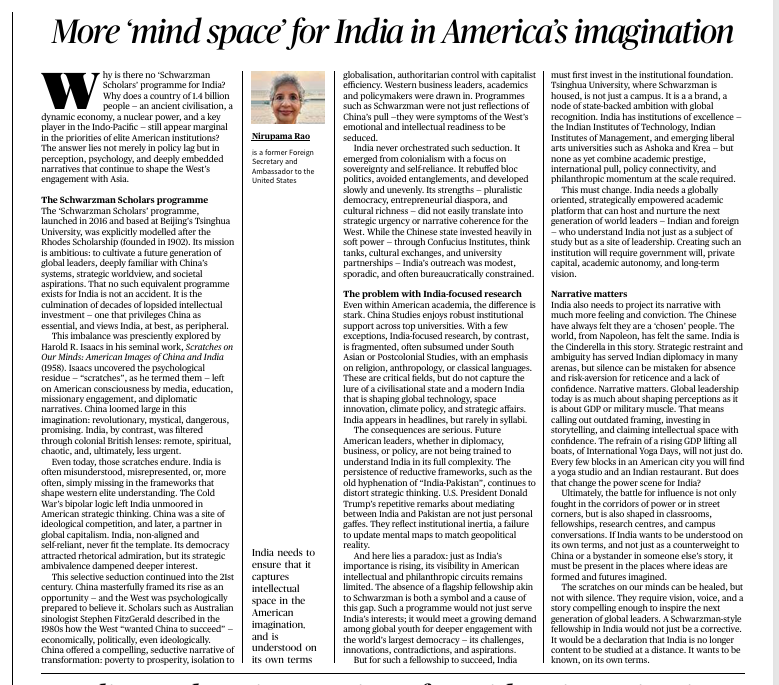I. Context and Background
- The editorial addresses a fundamental concern: Why does India not occupy a deeper space in the intellectual and institutional imagination of the West, particularly the United States?
- The immediate trigger is the absence of a ‘Schwarzman Scholars’-like program for India, modeled after China’s initiative to shape future global leadership aligned with its strategic worldview.
- The article explores the historical, psychological, and policy-level reasons behind India’s peripheral position in Western academia and proposes a roadmap for changing that.
II. Key Issues Raised
1. Schwarzman Scholars Programme – A Chinese Soft Power Tool
- Established in 2016 at Beijing’s Tsinghua University, modeled on the Rhodes Scholarship, to develop future global leaders familiar with China’s governance, political philosophy, and strategic outlook.
- It symbolizes China’s decades-long investment in building intellectual capital and shaping global elite perception.
- India has no such globally prestigious program that nurtures India-focused strategic understanding.
Implication: China’s narrative has been normalized in elite Western institutions; India lacks similar depth or presence.
2. Why India Remains Peripheral in Western Thought
- American elite consciousness continues to carry colonial-era filters about India—viewing it through lenses of:
- Poverty, mysticism, religion, spiritualism
- Anthropology and exoticism, rather than modern strategic or technological dynamism
- Poverty, mysticism, religion, spiritualism
- India is often misunderstood or oversimplified, especially when compared with China, which is viewed as a strong, focused, and future-facing global power.
- Even within academia, India-focused research is fragmented, often marginalized to South Asian studies or cultural studies, with little emphasis on India’s role in global economics or security frameworks.
3. Institutional and Strategic Vacuum
- India has not invested sufficiently in:
- Global think tanks
- Policy research institutions
- Academic diplomacy
- Narrative-building programs
- Global think tanks
- Chinese institutions like Tsinghua are heavily state-backed, while India’s premier institutes (IITs, IIMs, Ashoka, Krea) have not yet developed globally competitive programs with strategic branding.
- India’s democratic and pluralistic credentials remain undervalued due to weak institutional projection.
III. Core Argument and Author’s Perspective
- Nirupama Rao argues that to correct strategic asymmetry in perception, India must:
- Capture intellectual space in the West
- Develop its own elite programs that cultivate India-literate global leaders
- Stop relying on reactionary or defensive diplomacy
- Capture intellectual space in the West
- India must project itself as a modern civilization—not just a developing country or cultural hub—and align academic strategy with foreign policy goals.
IV. Strategic Implications for India
- Soft Power Diplomacy
India needs to institutionalize cultural and intellectual diplomacy, similar to how China, France, and even Japan have done through academic chairs, cultural institutes, and think-tank partnerships. - Narrative Ownership
India must own and tell its story—not be defined by colonial or Western templates. That requires:
- Strategic storytelling
- Investing in public diplomacy
- Engaging scholars, writers, and universities abroad
- Leadership in Thought and Action
India should stop appearing as a silent or risk-averse power, and instead embrace vision-led, values-driven leadership, backed by intellectual credibility. - Creating India-Centric Global Institutions
India must invest in creating India-themed scholarships, research centres, and leadership fellowships—offering alternative academic hubs for global students interested in India.
V. Conclusion
India’s global stature will not be complete without a corresponding intellectual presence. To be understood on its own terms—as a strategic, pluralistic, and modern civilization—India must shape elite global narratives that influence perception and policy. The road ahead lies in building knowledge-based partnerships, fostering academic diplomacy, and investing in mindspace as much as military or market space.


